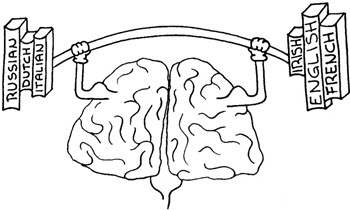
In modern research, being bilingual has been linked to various cognitive benefits. This contrasts with the earlier notion that being bilingual would detract from the individual’s cognitive abilities.
In a bilingual individual, the two languages interact and both languages influence the function of the other. Studies also indicate that bilingualism have a notable impact on cognitive functioning outside of language.
In their book “In Other Words”1, published in 1994, researchers Bialystok and Hakuta examines the hypothesis that the knowledge of two languages is greater than the sum of its parts. According to Bialystok and Hakuta, the benefit of being bilingual is not limited to the ability to use two languages. Learning and using more than one language can force us to think in more complicated ways.
Executive functions
Studies indicates a connection between bilingualism and enhanced executive functions. Executive functions are cognitive processes such as problem solving, mental flexibility (including task switching), attentional control and inhibitory control.
 Researcher Bialystok2 makes a distinction between two types of processing utilized by children during language development: analysis and control. Analysis is necessary to represent and understand abstract information, while control is required to selectively attend to specific structures whilst ignoring irrelevant information. According to Bialystok, it is in the aspect of control that bilinguals have an advantage over their monolingual peers when it comes to cognitive abilities.
Researcher Bialystok2 makes a distinction between two types of processing utilized by children during language development: analysis and control. Analysis is necessary to represent and understand abstract information, while control is required to selectively attend to specific structures whilst ignoring irrelevant information. According to Bialystok, it is in the aspect of control that bilinguals have an advantage over their monolingual peers when it comes to cognitive abilities.
In one study, Bialystok tested bilingual and monolingual children using a non-linguistic card-sorting task that required flexibility in problem solving, the ability to filter out irrelevant information, and a capacity for recognizing the constancy of certain variables in the face of rule changes. In this test, the bilingual children significantly outperformed the monolingual children.
In another similar study3 carried out by Bialystok, bilingual and monolingual children were shown to be equally good at representing the stimuli and inhibit learned motor responses. The bilingual children did however firmly outperform the monolingual children in a task requiring conceptual inhibition – the ability to inhibit previous associations and create new mental representations of the stimuli. This might be due to bilingual children’s habit of inhibiting competing labels in their two languages. Their ability to switch between languages and select the appropriate word might make them more apt at focusing on relevant information and inhibit irrelevant information.
Of course, it is very difficult to know if bilingualism leads to improved executive functions, or if a person with excellent cognitive functions are more likely to become bilingual. This issue has been addressed by researchers Hakuta and Diaz in their study “The relationship between degree of bilingualism and cognitive ability: a critical discussion and some new longitudinal data” published in 19854 .
Creativity
Several studies indicate that being bilingual have a positive impact on an individual’s creativity. Bilingualism is believed to enhance mental flexibility and a person’s ability to perceive situations in different ways, as well as the capacity for selecting and utilizing these various perceptions to suit the task at hand.
In one study5, bilingual and monolingual children were presented with problems that were either mathematical or non-mathematical, and asked to provide solutions. The children’s solutions were then rated on scales of creativity, flexibility and originality. In this study, the bilingual children outperformed the monolingual children.
Suggested reading
Adesope O. O.; Lavin T.; Thompson, T.; Ungerleider C. (2010). “A systematic review and meta-analysis of the cognitive correlates of bilingualism”. Review of Educational Research. 80 (2): 207–245
Bialystok E. (1988). “Levels of bilingualism and levels of linguistic awareness”. Developmental Psychology. 24 (4): 560–567
Hakuta, Kenji; Bialystok, Ellen (1994). In other words: the science and psychology of second-language acquisition. New York: BasicBooks. ISBN 0-465-07565-7
Ianco-Worrall A. D. (1972). “Bilingualism and cognitive development”. Child Development. 43 (4): 1390–1400
Cognitive ability in the elderly
In a paper6 published in 2004, researchers show how the normal decrease in attentional control observed in the elderly is reduced in bilinguals. This suggests that being bilingual somehow offers a certain degree of protection against the impact of cognitive ageing.
Studies indicate that bilingualism is one of a number of environmental factors that can help create a “cognitive reserve” in an individual, and that this cognitive reserve increases our ability to maintain cognitive functioning and postpone the onset of dementia symptoms as we age.
Here are a two examples of interesting findings regarding elderly bilinguals.
| Find | Source |
| Elderly bilinguals were better at switching between tasks, ignoring irrelevant information and resolving conflicting cognitive alternatives. |
Bialystok, Ellen (2006). “Effect of bilingualism and computer video game experience on the Simon task”. Canadian Journal of Experimental Psychology/Revue canadienne de psychologie expérimentale. 60 (1): 68–79 |
| Bilinguals diagnosed with dementia experienced the onset of symptoms and were diagnosed approximately 3-4 years later than monolinguals.
It is believed that bilingualism doesn’t prevent dementia, but delays the onset of symptoms of the disease. |
Craik, Fergus I. M.; Bialystok, Ellen; Freedman, Morris (2010-11-09). “Delaying the onset of Alzheimer disease: bilingualism as a form of cognitive reserve”. Neurology. 75 (19): 1726–1729 |
1Hakuta, Kenji; Bialystok, Ellen (1994). In other words: the science and psychology of second-language acquisition. New York: BasicBooks. ISBN 0-465-07565-7
2Bialystok E. (1993). “Metalinguistic awareness: The development of children’s representations of language”. In Pratt C.; Garton, A. Systems of representation in children: Development and use. Wiley & Sons. pp. 211–233
3Bialystok E, Martin MM (2004). “Attention and inhibition in bilingual children: evidence from the dimensional change card sort task”. Dev Sci. 7 (3): 325–39.
4Hakuta K., Diaz R. M. (1985). “The relationship between degree of bilingualism and cognitive ability: a critical discussion and some new longitudinal data.”. In Nelson K. E. Children’s Language, vol.5. Erlbaum. pp. 320–344.
5Leikin M. (2012). “The effect of bilingualism on creativity: Developmental and educational perspectives”. International Journal of Bilingualism. 0: 1–17
6Bialystok, Ellen; Craik, Fergus I. M.; Klein, Raymond; Viswanathan, Mythili (2004-06-01). “Bilingualism, aging, and cognitive control: evidence from the Simon task”. Psychology and Aging. 19 (2): 290–303

